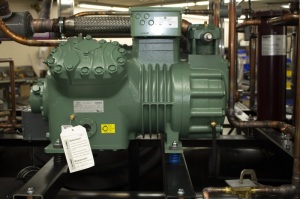por
John R. Fischer, Senior Reporter | September 04, 2018

During inspections, it is important to make
sure the compressor is not short-cycling
From the September 2018 issue of HealthCare Business News magazine
Ten years ago, chlorofluorocarbon refrigerants like the R22 were all the rage among chiller manufacturers seeking a standard, high-quality refrigerant. Fast forward to 2018, and these solutions have been entirely phased out and replaced with hydrochlorofluorocarbon refrigerants, such as R407c.
Proven to be less toxic and flammable than CFCs, HCFCs are a safer alternative for both technicians and the environment, and are but one example of the multiple changes affecting the maintenance and repair of chillers for MR systems today.
“Electrical efficiency is a key focus,” Tony Trumblee, medical account manager and Kyle Hastings, service manager for Glen Dimplex Thermal Solutions (GDTS), told HCB News via email. “Motor regulations, such as IE3, passed by the International Electrotechnical Commission, require more efficient motors that utilize less power. In addition, the technology of today has enabled chillers to utilize additional safety measures through monitoring devices, predictive monitoring and remote monitoring.”



Ad Statistics
Times Displayed: 75267
Times Visited: 5317 MIT labs, experts in Multi-Vendor component level repair of: MRI Coils, RF amplifiers, Gradient Amplifiers Contrast Media Injectors. System repairs, sub-assembly repairs, component level repairs, refurbish/calibrate. info@mitlabsusa.com/+1 (305) 470-8013
The breakdown of chillers can lead to serious issues,
including a quenched magnet, leaving
an MR system out of commission.
But there is still a need for humans to identify and understand the warning signs of chiller trouble, the impact they have on an MR scanner’s other components, and how best to approach each individual case.
When chillers burn out
The use of a chiller is vital to cooling and maintaining specific temperatures for a variety of components in an MR system, including shield coolers and shim coils.
One of the most important components it aids is the coldhead technology, which prevents liquid helium from evaporating into a gas. The breakdown of a chiller can contribute to this evaporation by causing the coldhead temperature to rise. If left unaddressed, such issues can cause serious damage, including quenching of the magnet, leaving the MR system out of commission.
It also creates a heavy expense for providers. “On MR equipment, there is danger of losing the helium charge, which is very expensive to replace,” Chris King, vice president of manufacturing for KR Products Inc. said.
Indeed, the cost per liter of liquid helium can range from as low as $3-$4 to between $40 and $50 depending on the country and its helium infrastructure. In the case of a quenched magnet or a full reload, these costs can become considerable.


Sunmi Song
Complete Chiller Care is more than Maintenance and Redundancy
December 14, 2018 11:13
This article has some good insight but there is a better, more cost effective solution than PM's and redundant circuits.
Remote monitoring, when done correctly, is like having a technician monitoring your chiller 24/7. Potential issues are addressed before they shut you down.
An ideal scenario would be to have redundant systems, regular maintenance and remote monitoring.
to rate and post a comment